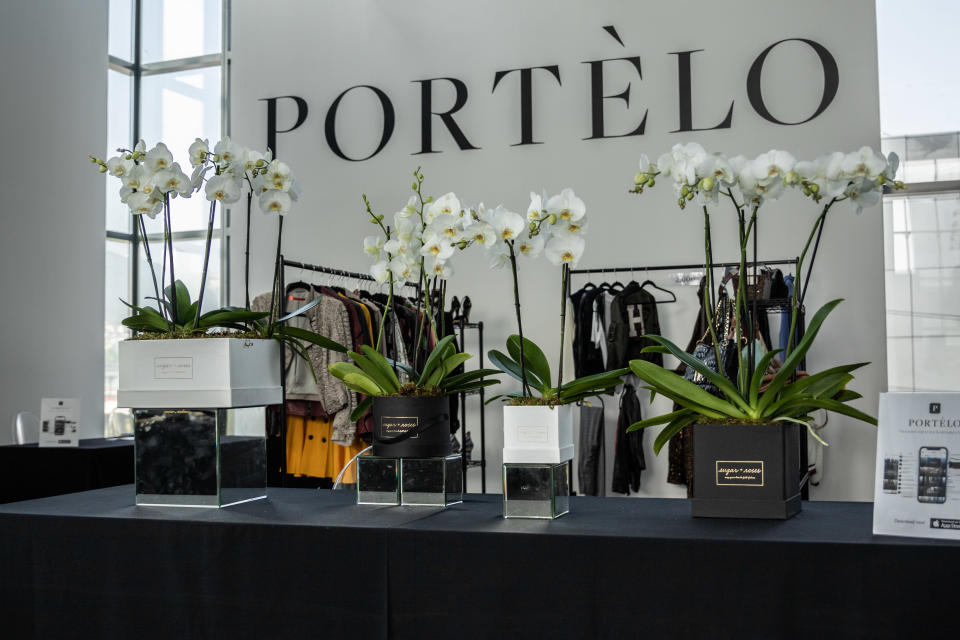[ad_1]

Mexico is getting into the resale game.
As secondhand shopping sheds its once-scorned skin and emerges in the country as a chic and sustainable alternative, Portèlo is providing the platform.
More from WWD
The women-owned luxury resale site that operates similarly to a Vestiaire Collective, launched pre-pandemic in 2019 when it was “still culturally taboo to buy secondhand,” Portèlo co-founder and chief executive officer Balbina Garza López, told WWD. But in the last year, the platform’s monthly active users have gone from 5,000 to 70,000 — a 1,300 percent increase, and with reach across all of Mexico’s 32 states.
“We knew we were onto something,” Garza López said, referring to herself and co-founder Jimena Ruiz. “We were seeing the tremendous international success for secondhand fashion.”
In fact, the secondhand market, according to resale platform ThredUp’s 2021 Resale Report, is growing at a rate 11 times faster than traditional resale and expected to climb from a $36 billion valuation in 2021 to $77 billion by 2025.
And if Portèlo’s growth is any indication, the market opportunity for resale in Mexico could be similarly ripe.

Barbara Santos Fotografia
Not holding any inventory for consignment, Portèlo allows users to buy and sell from their homes, with goods being exchanged via a quality and authentication checkpoint in Monterrey, and more locations are slated to open this year. There are other players in Mexico’s resale market, but none quite comparable, according to Garza López. SaleChopChop is “100 percent consignment” and GoTrendier is “100 percent marketplace,” so no included authentication, she explained.
“From your own home you post the listing of the product you want to sell and then once a buyer acquires it, you get a prepaid shipping label. You just print it, drop it off at whatever shipping company and it arrives at our physical quality checkpoint on the next day, sometimes on the same day…we try to send out products on the same day, but it’s a maximum of three working days,” Garza López said. “Once the buyer receives the product, they have 24 hours to open a dispute in case they need to…and once those 24 hours are passed the money is available for the seller to receive.”
The aim is to be quick, letting buyers and sellers trade fashion with ease and get paid out much faster than most platforms provide. Ratings keep the marketplace in check and Portèlo charges between 20 and 30 percent, depending on the value of the goods on sale.
“Anything over $1,000, we charge 20 percent. We try to make our commissions as attractive as they can be,” Garza López said. “Our sellers spend absolutely zero money on anything. They can send their products in an old shoebox — the idea is to reuse whatever you can, whatever you want — you won’t spend a cent, you will only receive your 80 to 70 percent payment at the end of the whole transaction and it’s intact, there’s no hidden fees.”
Portèlo authenticates its goods in the Monterrey location, too, using a mix of available market technologies and the team’s own diligent research.
“It is definitely something at the center of our process,” Garza López said. “We’re developing an internal manual for authentication from just all the things we’re collecting and we are looking into further on sharing that with the public, too, because again, we want to help each other have more information on this.”
So far, Portèlo has proven its concept in Mexico, though funding hasn’t been an easy road for the two female founders.
“We bootstrapped, me and my co-founder [were self-funded at the outset], we were profitable from the first month and up until the first 12 months because of this obsession of cutting costs and keeping it lean and just proving that we can be profitable,” Garza López said. “After the first 12 months of operation we did invite angel investors and they’re still with us now.”
But to find those investors, Portèlo had to kiss a lot of toads.
“From the beginning we just knew it would be harder for people to trust two young women that were starting this company that was really ambitious but at the same time was focused in the fashion industry. That’s something that men in Mexico wouldn’t particularly feel so respectful of in a professional sense,” Garza López said. “When we head to investors and we’re like, we have a start-up and they’re like, ‘OK.’ It’s about technology, ‘OK,’ logistics, ‘OK,’…and secondhand fashion. And they’re like, ‘OK, cute little girls.’
“And then it will become this conversation of, ‘Oh, so you have a shop, so it’s fashion? Well, we don’t really invest in fashion. It becomes a really small-minded world of investors in this country.”
What’s more, women in business still face gender-specific discrimination. And on this first day of Women’s History Month, it’s worth shedding some light on issues women have, and continue to face.
“Whenever I go to an investor, when [it’s] a man at least, they will ask you what are your plans on getting married, even why are you not married,” Garza López said. “But that is so normal here, we get that I would say nine out of 10 times we speak to men.”
Still, Portèlo has found two key backers — one male and one female (“We do want to have more women in our cap table. We do want to have more women investors because this is so important to us, really opening the door for more women,” Garza López said) — who have supported the business since the outset.

Courtesy Portelo
The first round of funding recently helped the co-founders launch Porta, the company’s second marketplace that embraces brands beyond luxury, including fast fashion. With Portèlo and Porta, it’s a bit like a Vestaire and Poshmark existing as two parts of the same business. It took Garza López and Ruiz just three weeks to get Porta up and running.
“We just replicated so much of our programming and processes and that was important for us because we were always trying to prove that this is a scalable business, that we can replicate so much of our business and our business model. And this what a lot of Mexican business investors have [asked], ‘But how is fashion scalable? How can it be exponential?’” Garza López said. “It was important for us to prove that we can do this in less than three weeks and launch an entire platform in this amount of time. We were like, ‘if this is not scalable, what is scalable?’”
Now, having proven the model’s concept out, Portèlo is wrapping a pre-seed funding round and heading on to the next level.
“We’re preparing for the seed round asap,” Garza López said. “That should be closed before the end of this year and we are focusing on expansion of markets.”
For now, Portèlo is only shipping goods to addresses within Mexico, but the aim is first to expand to markets across Latin America and then ultimately, the U.S.
So far, for Garza López, the best parts of the journey have been the give back rather than the gain.
On the sustainability side, one moment in particular stands out.
“One of my favorite top highlights [was] when a buyer from our platform…sold something and the product they sold came back in the same box that they had actually bought something in,” she said. “We are trying to make a full circle and the fact that customers are doing that naturally…— we hadn’t even started campaigns of reuse your boxes— …so that was a nice moment for me feeling connected to the customers.”
On the social impact side, the boon has been allowing Fundación Portèlo, the company’s charitable arm, to connect consumers with people in need thanks to a simple button on the shopping platform.
“As a seller, once you sell a product you have the option to not cash in that money for yourself but donate your earnings,” Garza López said. Already, Portèlo is working with patient support association Cruz Rosa and Alternativas Pacificas, an organization supporting women who have been victims of domestic violence.
“It’s great because it is a full circle. You sell a handbag and then what for you was something forgotten in your closet can for someone else be their meal or part of their education,” Garza López said. “And that’s pretty crazy to me, to think how different we can all live.”
Sign up for WWD’s Newsletter. For the latest news, follow us on Twitter, Facebook, and Instagram.
Click here to read the full article.
[ad_2]
Source link




/cloudfront-us-east-2.images.arcpublishing.com/reuters/ARHZ5EW6L5LVVIRTRRXQNLFDWA.jpg)









